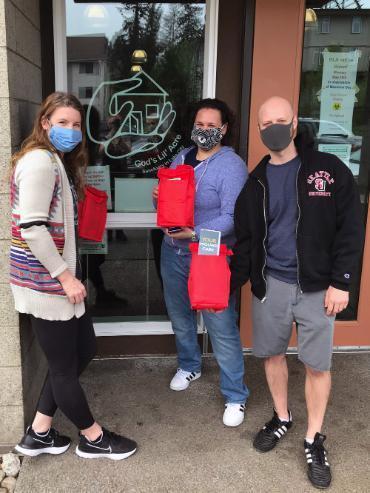
Nursing Students Build on Public Health Internship Experience


Sarah Dean, BSN ’20, and Brad Fifield, BSN ’20, received a grant from King County Nurses Associate (KCNA) to pursue their project “Navigating Wound Care for the Homeless”.
As students, Sarah Dean and Brad Fifield took part in the College of Nursing’s Public Health Internship (PHI)* program. This innovative program, which launched in fall 2019, pairs junior- and senior-level undergraduates with community agencies for 30 hours each quarter over the course of one year. This immersive community-centered learning experience introduces students to public health nursing and enables them to think critically about health advocacy beyond the bedside. In its inaugural year, PHI placed 81 students in 19 community health and social service agencies, with a total of 64 interprofessional mentors. Next year, 166 students will be matched into PHI service at local health and social service agencies.
Dean and Fifield were both interested in working with unhoused individuals and were placed at God’s Li’l Acre (GLA), a drop-in center in the Lake City neighborhood of Seattle. GLA is a collaborative effort of the Seattle Mennonite Church (SMC) and the Lake City Partners Ending Homeless, a group that has fostered several programs that work to provide shelter and trauma informed services to individuals in the Lake City area experiencing homelessness or housing instability. The College of Nursing has had a longstanding partnership with the SMC providing opportunities for nursing students to engage in services for unhoused individuals and families since 2008.
During the internship at GLA, both Dean and Fifield noticed a significant need for appropriate wound care. “We saw chronic non-healing, acute, and infected wounds,” said Dean. “Based on research and interviews, we found that this issue was pervasive and multifaceted. There is a litany of risk factors that increase homeless individuals’ risk for acute or chronic wound and an even longer lists of barriers and inequities that prevent them from accessing appropriate wound care.”
The two teamed up to develop a method to provide safe, accessible wound care supplies to those they cared for at GLA. Dean said, “we formulated an intervention that operates under the harm reduction model, integrates positive change, and meets individuals where they are in the management of their health. Our main goal is to establish a system of providing accessible, clean, and appropriate wound care supplies to individuals living through homelessness in the Lake City Area.”
The team (Dean and Fifield) implemented their first round of wound care kits in May. Each kit is equipped with dressing components, including waste bags, tips for old dressing removal, educational handouts with simple instructions for care, signs and symptoms of infection, and local health care resources. They chose a durable, water-proof container (insolated lunch bags) for the kits to keep materials intact and dry. They plan to continue project operations throughout the summer.
“Through partnership and community buy-in, we hope this project continues beyond our time at Seattle University and becomes a mainstay at GLA,” said Dean “We hope this project makes a sustainable impact on this organization, promotes health care literacy, community wellbeing, and empowers individuals to take charge of their health.”
Sarah Dean and Brad Fifield took some additional time to tell us a little more about themselves and future career goals in this Q&A.
Where did you grow up? What brought you to Seattle U?
Brad Fifield: I am originally from New Hampshire. What brought me to Seattle U was the unique College of Nursing program that emphasized community service and outreach.
Sarah Dean: I grew up in Coeur d’Alene, ID and moved to Seattle to attend SU after being recruited to play for the women’s soccer team—Go Redhawks! I graduated with a degree in General Science with an emphasis in Chemistry and Biology. Following a career in critical care research, I decided to return to Seattle U to pursue my BSN.
What drew you to pursue your BSN at Seattle U?
Brad Fifield: Prior to moving to Seattle for my bachelor’s degree, I was living in San Diego working towards an associate’s degree in Pre-Nursing. I knew I wanted to stay on the West Coast and found that Seattle U had the values I was looking for in a nursing program as far as engaging with the local community, emphasizing care and compassion for patients, and encouraging the importance of constant self-care and reflection.
Sarah Dean: As a graduate of Seattle U, I knew its mission and teaching philosophy were centered upon the commitment to providing a holistic education. One that empowers, pushes, and supports its students to become leaders dedicated to social justice and enacting change. Knowing this, I was drawn to return to the SU campus to pursue my BSN. I knew it’s mission would shape the type of nurse I wanted to become; a nurse devoted to community-centered advocacy, compassion, and service.
What are your plans or career goals after you graduate?
Brad Fifield: My career goal is to work as a cardiac ICU nurse for several years after graduating and then apply to CRNA school. Throughout that time, I would also like to take what I have learned from this community health class and apply it to future projects and volunteer opportunities that can benefit my local community.
Sarah Dean: While I am still open to exploring the many fields of nursing, my goal is to continue working in the community hospital setting ultimately focusing on emergency and critical care medicine. I aspire to return to graduate school to pursue a DNP program of Adult Gerontology Acute Care and someday return to clinical research.
*The PHI is pending approval of NCQAC